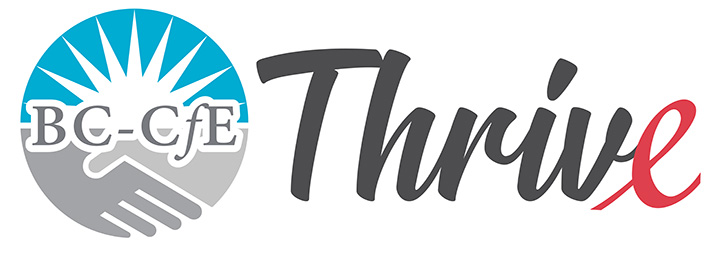THRIVE
Older adults living with HIV (OALHIV) (i.e., age ≥50) now constitute over 50% of all people accessing HIV treatment in BC. As OALHIV age, the need for supportive care in non-acute settings, including home and community care (HCC), is increasing. The Thrive research project was co-created alongside OALHIV in BC to support people to thrive during all stages of life. Phase 1 of the project linked treatment and demographic records for OALHIV accessing care in BC. Phase 2 took a community-based research approach to understand obstacles and pathways experienced by OALHIV in accessing HCC.
STUDIES MENU
Publications
Stronger Together is a BC-CfE research project focused on home and community care services currently available for older adults living with HIV. An “older adult living with HIV” is anyone living with HIV who is 50 or older. The home and community care system includes home support services and care homes. Through these services, older adults receive assistance with a range of select daily tasks, either in their own homes or in care homes. Older adults living with HIV can face a greater range of illnesses, socio-economic challenges and mental health issues than their peers who do not have HIV. As a result, they have unique needs that the home and community care system needs to consider.
Through this project, researchers at the BC-CfE created an overview of the home and community care landscape across the province. Researchers also uncovered where the home and community care system is supporting older adults living with HIV, and where there may be gaps. This information is available in the The BC Home and Community Care System and Older Adults Living with HIV.
As part of the project, researchers surveyed community-based organizations to determine what services they provide that could fill in the gaps left by the home and community care system. This information is available in A Provincial Overview of Community-Based Organizational Supports for Older Adults Living with HIV.
Community members, service providers, researchers and community organizations came together to discuss services available for older adults living with HIV at a community roundtable. Participants at the roundtable shared their knowledge of, and experiences with, the home and community care system.
Both BC-CfE reports now include updates based on participants’ input at the roundtable discussion. Participants let researchers know what is important to explore further in upcoming BC-CfE research on HIV, aging, and home and community care. You can read a plain language summary of the community roundtable discussions here Community Round Table on Aging, HIV, and Home and Community Care: discussion summary.
Many thanks to the individuals and organizations who contributed to these reports, and to the people who attended the community roundtable and whose voices are reflected in the discussion summary.
Academic Publications
Finding the Balance: Embracing the Two-Eyed Seeing Approach to Understand what Cultural Safety in Care Means to Older Adults Living with HIV
Anna Vorobyova, Antonio Marante, Claudette Cardinal, Patience Magagula, Sharyle Lyndon, McKenzie Braley, Kathleen Inglis, Surita Parashar, J Appl Gerontol. 2022
Abstract
Older adults living with HIV (OALHIV) are a fast-growing demographic who rely on home and community care (HCC) services. Cultural safety (an environment free of racism that fosters feelings of safety and respect) is integral to HCC services. We conducted 27 semi-structured interviews with OALHIV in Vancouver, British Columbia about their HCC experiences. Excerpts about cultural safety were qualitatively analyzed using Two-Eyed Seeing. Our themes-Voices from across Turtle Island, Voices from the African continent, Western Perspectives, and Universal Principles-indicate that cultural safety is important yet lacking. While specific aspects of culturally safe HCC services varied between and within cultural groups, some aspects were shared by participants across groups (e.g., respect, compassion, and non-judgment).
Characteristics of older adults living with HIV accessing home and community care services in British Columbia, Canada
Katrina Koehn, Heather Burgess, Sharyle Lyndon, Michelle Lu, Monica Ye, Robert S. Hogg, Surita Parashar, Rolando Barrios & Kate A. Salters (2020) Characteristics of older adults living with HIV accessing home and community care services in British Columbia, Canada, AIDS Care, DOI: 10.1080/09540121.2020.1770673
Abstract
Over half of people living with HIV (PLHIV) engaged in care in British Columbia (BC) are age ≥50. The public home and community care (HCC) system offers formal support that PLHIV may turn to as they age, but little is known about access specific to PLHIV. Using data from the STOP HIV/AIDS® cohort, which includes linked treatment and demographic records for PLHIV accessing care in BC, we compared older PLHIV (defined as those age ≥50) who did and did not access HCC services. We estimated adjusted odds ratios (aORs) for factors associated with HCC service utilization using logistic regression. This study included 5,603 PLHIV age ≥50, 837 (14.94%) of whom accessed any HCC service between 2005 and 2015. Services most commonly used were community nursing (8.98%, n = 503) and rehabilitation (7.73%, n = 433). Those who received HCC were more likely to be female (aOR = 1.56, 95% CI = 1.24, 1.98), have a history of injection drug use (aOR = 1.88, 95% CI = 1.57, 2.25), have a higher Charlson comorbidity score (aOR = 1.11, 95% CI:1.07, 1.15) and to have visited a general practitioner in the past year (aOR = 2.17, 95% CI = 1.77, 2.67). Approximately 15% of older PLHIV have accessed HCC, but the extent of potential unmet need for these services requires further research.

